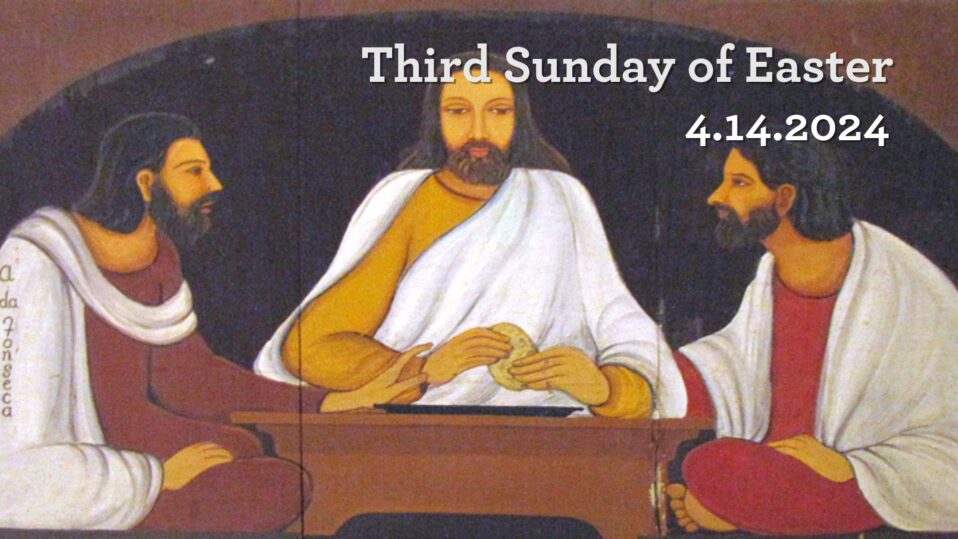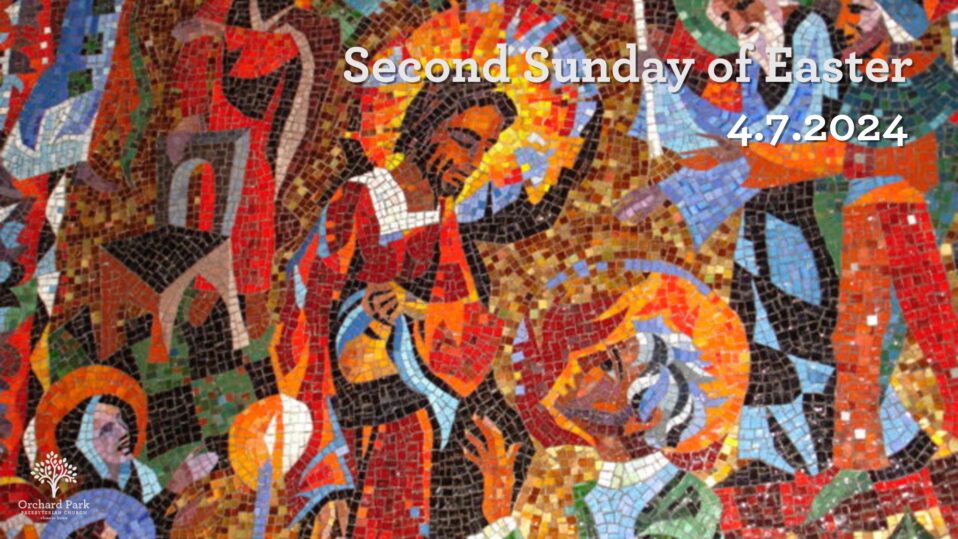If you ever owned a red-letter Bible you know that when the lettering is red, it means that Jesus said them. There is ton of red ink in this passage this morning. Jesus has a lot to say. I wonder what the disciple’s reaction was when his speech is over. Did they feel terrified or optimistic.
If this was a job description on Indeed would you apply?
It’s a very specific job description. Jesus tells them where to go, what to say, what to bring, what to do and how to respond when things don’t go well. Read this passage with me and imagine you are one of the twelve. Where would you stop and ask for clarification? Would there be any point where you would pull your name as an applicant?
10:5 These twelve Jesus sent out with the following instructions: “Go nowhere among the Gentiles, and enter no town of the Samaritans,
10:6 but go rather to the lost sheep of the house of Israel.
10:7 As you go, proclaim the good news, ‘The kingdom of heaven has come near.’
10:8 Cure the sick, raise the dead, cleanse the lepers, cast out demons. You received without payment; give without payment.
10:9 Take no gold, or silver, or copper in your belts,
10:10 no bag for your journey, or two tunics, or sandals, or a staff; for laborers deserve their food.
10:11 Whatever town or village you enter, find out who in it is worthy, and stay there until you leave.
10:12 As you enter the house, greet it.
10:13 If the house is worthy, let your peace come upon it; but if it is not worthy, let your peace return to you.
10:14 If anyone will not welcome you or listen to your words, shake off the dust from your feet as you leave that house or town.
10:15 Truly I tell you, it will be more tolerable for the land of Sodom and Gomorrah on the day of judgment than for that town.
10:16 “See, I am sending you out like sheep into the midst of wolves; so be wise as serpents and innocent as doves.
10:17 Beware of them, for they will hand you over to councils and flog you in their synagogues;
10:18 and you will be dragged before governors and kings because of me, as a testimony to them and the Gentiles.
10:19 When they hand you over, do not worry about how you are to speak or what you are to say; for what you are to say will be given to you at that time;
10:20 for it is not you who speak, but the Spirit of your Father speaking through you.
10:21 Brother will betray brother to death, and a father his child, and children will rise against parents and have them put to death;
10:22 and you will be hated by all because of my name. But the one who endures to the end will be saved.
10:23 When they persecute you in one town, flee to the next; for truly I tell you, you will not have gone through all the towns of Israel before the Son of Man comes.”
The call of the disciples according to the Gospel of Matthew takes place while Jesus is living. Unlike in Luke and the following book Acts, in Matthew the disciples get to work on the Jesus’ mission after Jesus has ascended, but in Matthew, the mission starts while Jesus is living. Jesus gives them the same authority that he has. He looks around and says,
The harvest is plentiful, but the laborers are few; therefore ask the Lord of the harvest to send out laborers into his harvest” (9:37-38). Paired with Jesus’ compassion is a sense of urgency. The time is ripe for their mission, so he summons them and gives them “authority over unclean spirits, to cast them out, and to cure every disease and every sickness” (10:1).
The language is striking because it is a near mirror image of the words used to describe Jesus’ own practice in 9:35: “Jesus went about all the cities and villages, teaching … and proclaiming … and curing every disease and every sickness.” Jesus gives them the authority to act on his behalf.
Not only does he share his authority, he shares his compassion. There’s a sense of urgency here, that can’t wait. There are too many people who are lost and do know about the kingdom of God
The motivating factor that moves Jesus into gather his disciples and put them to work is compassion. The word compassion in Greek means to be moved internally, by the inside out. To feel moved in your gut to respond.
Jesus and the first disciples let compassion pierce their own hearts and reaped great abundance. Those of us who have committed our lives to being a disciple of Jesus are called to the do the same.
Unless Christ’s disciples who continue laboring for the harvest are pierced by the same cries of hurting humanity that moved him, the church will never be able to respond to its call. Only when the hearts of disciples are in sync with Christ’s can this compassion come through clearly and can the church fulfill its mission.
A young person once told Billy Graham that he or she would be going on a mission trip with a church youth group. The group planned on serving a village in a very poor country, helping to put a roof on their church and doing some Bible programs for children. The young person asked Billy Graham for advice.
Billy Graham replied:
“But God not only wants to work through you to help others. He also wants to work in you while you’re serving the people of this village. Be alert to His leading, therefore, asking Him to use this experience to teach you new things about Himself and what He is doing in the world. You may discover, for example, that in spite of their poverty, the people of this village are actually rich in faith and love. Sometimes our wealth and comfortable lifestyle get in the way of a true commitment to Christ.”
“God may also want to open your eyes to the needs of the world. Most people today have very little, compared with what we have; many, in fact, face hunger and disease almost daily. Do we care? Many also do not know Christ, and have never had an opportunity to hear of His love.”
Billy Graham’s message is also a message for us. As we serve others, God will work in us and teach us new things about Him and what He is doing in the world. He will teach us about other Christians through other people.
If we are to serve others, we must serve them as they need to be served and not as we decide to serve them. It is important for us to make faith in Christ an option-making faith a possibility to people. In doing so we respect their freedom while making them aware of their responsibility.
Jesus says. “To the crowds for whom I have compassion.” . . . A hymn from the late 1990s says it best – and it’s from the Christians in Cuba so it has a really fun, get-your-toe-tapping, get-yourself-ready-to-get-on-out-of-your-seat beat. The words go: “sent out in Jesus’ name, our hands are ready now to make the earth the place in which the kingdom comes. The angels cannot change a world of hurt and pain into a world of love, of justice and of peace. The task is ours to do, to set it really free. O help us to obey and carry out your will” (“Sent Out in Jesus’ Name,” #2184 in Sing the Faith, 2003). . . . It’s still needed like that today. That every one of us go forth into wherever we find ourselves each week.
It’s very easy to go about our daily lives and forget that Jesus calls us to care beyond our personal selves and well being. Forever and always the harvest has been plenty and the workers have been few. Will you do this work? Will you bring a healing word with you wherever you go. Will you speak a little gentler, listen more intently, offer encouragement, be patient, welcome strangers, and seek understanding of those who see the world differently than you. If you do these things you will be criticized, judged, and silenced. Staying faithful to God’s call will not be without pain, loneliness, and retaliation. No one ever said it would be easy, but easy is boring.
I would like to close with a portion of a sermon given by Archbishop Desmond Tutu in 2004 in Southwark Cathedral
God will not heed your worship, your beseeching, for your hands are full of blood, the blood of your sisters and brothers killed in wars that were avoidable. Demonstrate your repentance by how you treat the most vulnerable: the orphan, the widow, the alien. When you are king over this people, and this God gives you God’s righteousness, it is so that prosperity will prevail, will prevail because as king, you judge rightly, you judge rightly especially the poor with equity, you give justice to the poor, you deliver the needy when they cry and the poor man who has no helper. You will pity the helpless and needy and save the lives of the poor. How many of our governments would pass this stringent test: “how did you deal with the poor?”
And when God’s spirit anoints you, it is so that you may preach the Good News, especially again to the poor, to preach the release of the imprisoned ones
To be partakers of the divine nature means we become more and more God-like, treating all with an even-handedness, even those we regard as evil. This God, who lets God’s sun shine on good and bad alike; who makes God’s rain fall on all, for all, and we, who want to be God-like, are asked to forgive, even as God has forgiven us in Christ, forgive even that which we consider to be unforgivable.
To be like this God, who gives up on no-one, who loves us, not because we are loveable but that we become loveable only because God loves us, God loves us with a love that will not let us go, a love that loved us before we were created, a love that loves us now, a love that will love us forever, world without end. A love that says of each single one of us: “I love you, you are precious and special to me, I love you as if you were the only human being on earth, I love you and there is nothing you can do to make me love you more because I already love you perfectly.”
How incredibly, wonderfully, it is that God says to you, to me: “There is nothing you can do to make me love you less. I take you, I take you very seriously, I take you – you – body and soul, you the visible and the invisible of you, I love you, I love you, I love you.”
Amen,
Rev. Dr. Shelly Wood



